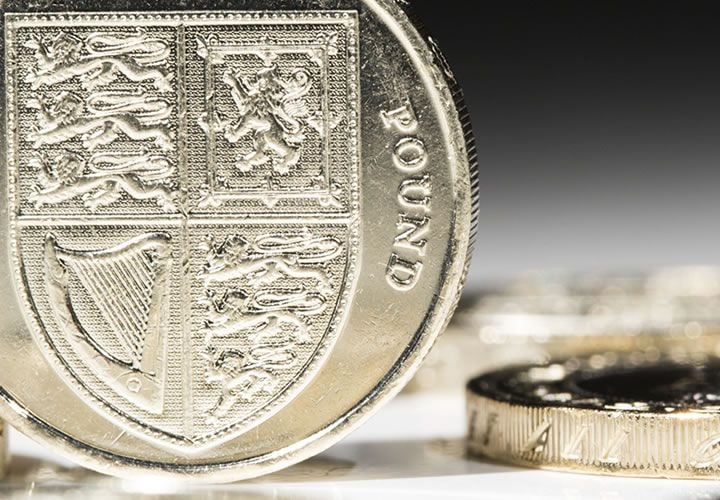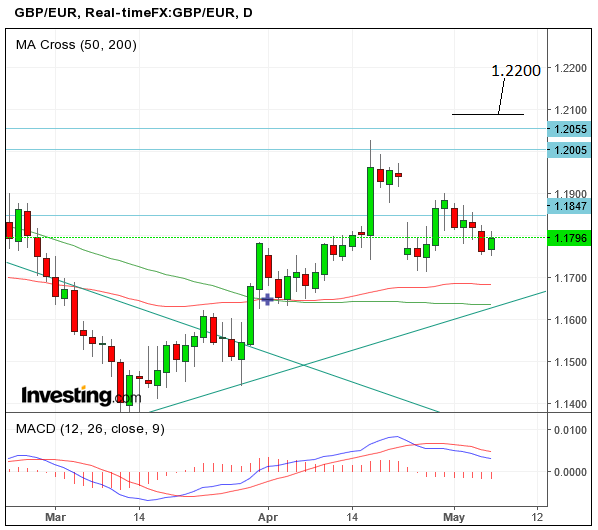Pound Sterling Forecast to Maintain Mild Upside Bias Against Euro on Exchange Rate Markets this Week

A strong start to the week for the British Pound which continues in its quest to recapture that ground lost against the Euro following the first round of the French Presidential election.
In fact, the second round of the vote has had little impact on the GBP/EUR exchange rate at all; if anything it has played into the hands of the Pound.
The victory for the centre of French politics in the form of Emmanuelle Macron and the defeat of Eurosceptic Marine Le Pen was too much of a 'fait accompli' to move markets, and the Euro has actually lost ground in a typical 'buy the rumour, sell the fact' action that so often characterises foreign exchange markets behaviour.
Looking ahead, our studies suggest the near-term outlook favours the Pound based on underlying momentum.
Yes, momentum is not as convincing as it was back in mid-April, but the exchange rate remains structurally biased higher.
At the very least, the Euro has a lot more work to do before it shifts trend and pushes the Pound to Euro exchange rate into a bear-trend. As such, any weakness is forecast to be limited at this juncture.
We believe there is a slight bias that it will continue higher because that is the direction in which it was going before it formed the current consolidation:

It may be in the beginnings of a triangle pattern, however, it is too early to say for sure.
"Our momentum studies remain bearish," says Robin Wilkin, a technical strategist at Lloyds Bank on the Euro's immediate prospects against the Pound.
Wilkins still sees the exchang rate likely to edge up towards 1.19047-1.1940.
The exchange rate is above the 200 and 50-day moving averages which is a bullish sign, but the MACD momentum indicator in the lower pane of the chart is falling.
This could suggest emerging underlying weakness and the possible onset of a phase of bearishness is on the horizon.
If the short-term trend continues and breaks above the mid-April highs and the 1.2055 pivot level that will be a clearer confirmation it is extending higher.
As such we see a move above 1.2100 as leading to a continuation up to 1.2200.
Fundamentals to Watch for the Pound
From a fundamental perspective, the main release for the Pound is the Bank of England (BoE) rate meeting and their quarterly inflation report due at 12.00 GMT on Thursday, May 11.
No change in policy is forecast because of the ‘purdah’ preventing the authorities from making major announcements and changes to policies in the run-up to the general election.
However, in the inflation report the BoE may downgrade growth expectations and raise inflation (notwithstanding the recent fall in oil), but according to analysts at Canadian lender TD Securities, the governor is expected to, “steer things back to neutral during the presser.”
Barclays expect the communication to be slightly hawkish, in an effort to boost the Pound and keep inflation at bay.
Barclays also see the bank likely to forecast inflation to rise and GDP to fall, although only during 2017, as falling oil prices will bite in 2018, slowing inflation in the longer-term:
“As for the communication, we believe the Committee will be eager to repeat its slightly hawkish message from the February inflation report, keeping the focus on inflation, and banking on the support provided to sterling to mitigate risks of excessively high and sticky inflation. Changes in forecasts will be consistent with such a move sideways as we expect GDP growth to be revised slightly lower but inflation slightly higher."
Other important data released this week includes the RICS House Price Balance (Apr) at 00.01 on Thursday, May 11, Industrial and Manufacturing Production at 09.30 on the same day and the Trade Balance in March, also at 9.30.
Data, Events for the Euro
The French presidential election resulted in a landslide victory for the independent centrist candidate Emmanuelle Macron but it did not translate into a substantial upside move for the Euro as many had expected.
Instead, EUR/USD was barely changed after the news of his victory, most of the upside having already been ‘priced in’ after his convincing first round win.
Macron said he would be seeking to ‘unify’ Europe – a view which sees him endorse the European project, and has had some commentators opine that he could make Brexit negotiations harder for the UK. This has not, however, weighed on Sterling so far.
The Euro’s other main release this week is Industrial Production, out on Friday, May 12 at 10.00 GMT, which is likely to show a 0.3% rise in March from -0.3% previously.





